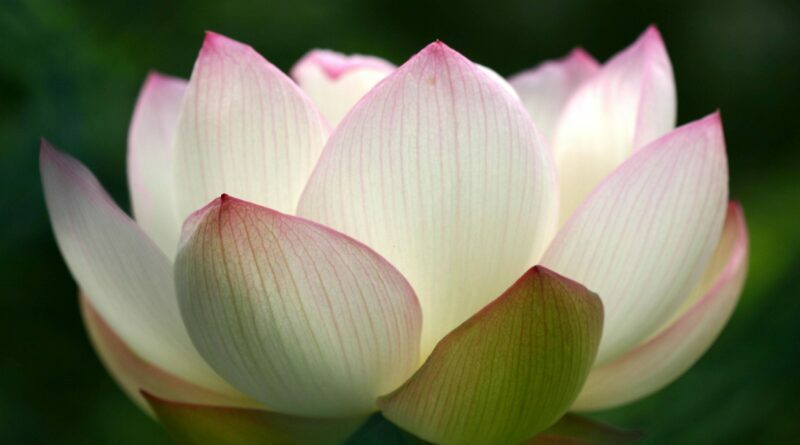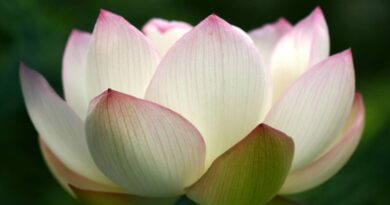IN HARMLESSNESS IS STRENGTH
In Harmlessness Is Strength
A while back, I was reading some introductory pamphlets on Buddhism. And there was a common pattern. They started out by saying that Buddhism is a religion of self-reliance. Then a few pages later they would say that Buddhism teaches there is no self. It’s amazing that anyone, after reading those brochures, would continue to be interested.
The first statement is actually true. The Buddha teaches us to rely on ourselves. If we’re going to find happiness in life, we have to develop the qualities of the path: virtue, concentration, and discernment. Or to develop meritorious activities: generosity, virtue, and meditation.
In the course of doing that, we develop a very strong sense of self, a healthy sense of self. But as the practice develops, we find that the sense of self becomes more and more just a concept that we use, a tool that we use. As long as it has its uses, we continue to hold it. It’s like a toolbox: There are lots of different selves in there. Some of the selves will be useful for some times; others will be useful other times.
There comes a point, though, where you find the ultimate happiness and you don’t need any tools anymore. That’s when you can put them all down. But before you put them down, you’ve got to learn how to use them well. Otherwise, you can’t get to the point where you can put them down.
The harmless selves in your toolbox are the ones you want to encourage, to put to use. Now, it may seem ironic that part of having a strong sense of self is that you try to make the self as harmless as possible. We tend to think of people with a strong sense of self as often being careless in their treatment of others, but that’s not genuine strength. The more you harm others, the more you’re creating a debt. The more debts you have, the weaker you are. So we’re trying to live a life that’s as debtless as possible, which means that we have to look inside to develop the qualities we need for happiness, so that we need to rely less and less on other people. We develop our own mindfulness, we develop our own concentration, our own discernment, so that as we go through life—not only as we’re sitting here meditating but also as we deal with other people—we can be as light as possible.
Ajaan Suwat used to make a lot of this point. He was saying the Buddha teaches a lot about how this is not-self and that’s not-self, but then he gets to that passage we chanted just now, “I am the owner of my actions.” That’s what you want to focus on, because that’s where you are responsible. This is our motivation for developing the mind, because all our actions do come out of the mind.
Many of us come to meditation for rest and respite. But we stay because we see that once the mind has rested, it can be a lot more skillful in dealing with situations around us.
It’s just important that you keep in mind the fact that as long as you’re acting, there’s going to be some burden on other people. For example, with the precepts: The precept against killing comes down to two points—you don’t kill and you don’t order other people to kill. Sometimes you hear it as a precept of total harmlessness. But that’s impossible. Even when you live a vegan lifestyle, it’s a burden on some people: the people who have to work in the fields, the bugs that get sprayed. Even with organic produce, it’s not that they don’t use pesticides. They’ve just invented organic pesticides. They kill all the same.
So we try to live a relatively harmless life as best we can. And in the areas where we do have control over things, we try to be totally harmless. That keeps turning us back on ourselves: Where do we find the strength to maintain that harmlessness? After all, harmlessness requires a lot of care. And the things we used to depend on other people for: We’ve got to find resources to provide those things from within ourselves.
This way, we can go beyond what’s just bright action and turn those bright actions into what the Buddha calls actions that are neither dark nor bright. Those are the ones that take us out of the cycle entirely. Only then can you be totally harmless.
This is why they say the arahants are the only people who live in the world without any debts at all. They’re still eating the food that other people give them, but the merit that those people gain from feeding the arahants is multiplied many times over. Even the animals that were killed for that food—in case animals got killed someplace in the process—get merit too. In other words, the goodness that the arahants pump back into the world more than compensates for whatever burden they still place on it. But for the rest of us, we’re still in a position where we’re creating burdens. So we want to keep them as light as possible.
Now, this doesn’t mean that you don’t accept help from other people when they volunteer it. I saw a case years back: a former policeman in Singapore who was constantly afraid of being in debt to other people. He was living in relative poverty. He’d retired from the police force to look after his mother, and they were living on a very small pension. A group of people came one day to bring some food to me, and one woman had prepared extra food so that the policeman could take it home for him and for his mother. But he refused her gift, out of fear of being in debt to her. That offended her so much that she cursed him. Literally. She yelled, “I curse you!” three times.
That’s being too worried about having debts. When people voluntarily give you help, you accept it, unless the help is inappropriate in one way or another. But as for appropriate help, those should be the kinds of debts you don’t mind. It’s the cases where you’re imposing on other people against their will: That’s what you’ve got to watch out for. And try your best to be as light as possible on the world in general.
When the Buddha talks about the principles of the practice that have to do with other people, the primary one is being unburdensome. To be unburdensome, you learn how to be content with what you’ve got. And to be content with what you’ve got, you’ve got to develop your sources for true happiness inside.
So this issue keeps coming back to what you’re doing right here, trying to develop a sense of well-being that you can feed on inside so that you’re not feeding on people outside. This is why developing the pleasure of concentration is not a bad form of clinging. You may be clinging to it, but you’re clinging to something good. It’s a good attachment. If you don’t have this form of pleasure, you’re going to go sneaking out and finding your pleasure in other places, not all of which may be skillful, and many of which are harmful both to yourself and to others.
So learn to develop the strength of concentration, the strength that comes from having a sense of pleasure and well-being that you can feed on inside. Now, it’s important that you have the right attitude toward it, as you’re focused on the breath. In other words, you should stay focused on the breath and not on the pleasure. You focus on the breath in a way that gives rise to that sense of pleasure, but then you let the pleasure do its work, you don’t have to go running after it or wallowing in it. As long as you’re producing it, you’ve got what you need. The pleasure will do its work. You just allow it to spread around the body.
It’s in this way that the Buddha said when he was practicing austerities, he didn’t let the pain of the austerities overcome his mind, but when he found the pleasure of concentration, he didn’t let the pleasure overcome his mind, either. That didn’t mean he stopped doing the concentration—he continued doing it and got deeper and deeper into it—but he stayed focused on his object even as he kept producing the pleasure.
Because, as he said, if you don’t have this kind of pleasure, then you keep running back to the pleasure of sensuality. Even though you may know the drawbacks of sensual pleasures—you can contemplate that list of the thirty-two parts of the body, that we chanted just now, over and over and over again, and think about all the other drawbacks of sensual pleasures—but if you don’t have an alternative, the mind’s going to go sneaking out for a bite of sensuality again.
So you’ve got to develop this source of well-being inside. This is how you become harmless. This is how you become strong—because the strength lies in the harmlessness.
When the Buddha began to get disillusioned with his austerities, he recalled the time when he’d gotten the mind spontaneously into jhana when he was a young child. The first question he asked himself was, “Why am I afraid of that pleasure? Is there anything blameworthy there?” Now, a blameworthy pleasure would be one that causes harm to other people and would cloud the mind. There are lots of pleasures in the world that cloud the mind and harm other people. But this doesn’t. He realized, as a result, that this was a pleasure he didn’t have to be afraid of. So he worked on it, developed it, learned to tap into it whenever he needed it. And it became the main factor of his path to awakening.
So allow yourself to find what way of breathing gives the most pleasure, what way of settling the mind with the breath gives the most pleasure. This is a skill you need to develop in order to go through the world both with harmlessness and with strength.



